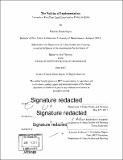The politics of implementation : towards a pro-poor land legalization policy in Quito
Author(s)
Goyes, Francis Jhoan
DownloadFull printable version (17.20Mb)
Other Contributors
Massachusetts Institute of Technology. Department of Urban Studies and Planning.
Advisor
Balakrishnan Rajagopal.
Terms of use
Metadata
Show full item recordAbstract
This thesis explores Quito's historical development of policies for informal neighborhood legalization to analyze the relationship between the national government, municipal council and low-income neighborhoods of the City. I follow Gilbert and Ward's reasoning of regarding the State as a political entity, and its policies of land as a proxy of its relation to the most vulnerable populations (Ward 1985). I ask how constitutional and legislative arrangements were implemented through different political moments, and in what ways their implementation contributed to the successes and failures of the land legalization efforts of Quito using a pro-poor framework. I concentrate on the policies enacted by the last three Municipal administrations as well as Regula tu Barrio (Legalize your Neighborhood), the current program for legalizing informal settlements in Quito. While legalization policies have existed since the late 1980s, they were never fully operationalized due to the low capacity of the Municipality, clientelist practices and lack of continued political interest. Through a pro-poor policy analysis, I argue that following the ratification of the 2008 Constitution and other national legislation, the Municipality had a greater responsibility towards establishing a pro-poor policy towards land legalization, which resulted in an increase of legalized neighborhoods and basic infrastructure provision for previously informal settlements. I also show that while there appears to be continuity through Municipal administrations, difficulties for legalization remain, including evaluation mechanisms, overcoming obstacles of land traffickers and community organizations and creation of a comprehensive policy for land and housing.
Description
Thesis: M.C.P., Massachusetts Institute of Technology, Department of Urban Studies and Planning, 2017. Cataloged from PDF version of thesis. Includes bibliographical references (pages [99]-107).
Date issued
2017Department
Massachusetts Institute of Technology. Department of Urban Studies and PlanningPublisher
Massachusetts Institute of Technology
Keywords
Urban Studies and Planning.